#java course in coimbatore
Explore tagged Tumblr posts
Text
Unlocking Java Excellence: The Java Course in Coimbatore with Livewire Institute
Introduction:
In the dynamic landscape of technology, learning Java has become a gateway to unlocking a world of programming possibilities. Coimbatore, a bustling hub of education and industry, has witnessed a surge in demand for quality Java courses. Among the prominent institutions offering comprehensive training in this programming language, Livewire Institute stands out as a beacon of excellence, providing aspiring developers with the skills needed to thrive in the ever-evolving tech industry.
The Growing Demand for Java Expertise in Coimbatore:
As Coimbatore cements its position as a technological hub, the demand for skilled Java developers has skyrocketed. Industries ranging from IT to sponsors and beyond seek professionals adept in Java to build robust and scalable applications. Recognizing this demand, Livewire Institute has tailored its Java course to meet the specific needs of learners in Coimbatore.
Livewire Institute's Comprehensive Java Course:
Livewire Institute's Java course in Coimbatore is designed to cater to both beginners and experienced developers looking to enhance their skills. The curriculum covers the fundamental concepts of Java programming, object-oriented programming principles, and advanced topics such as multithreading, database connectivity, and JavaFX for building graphical user interfaces.
The institute employs experienced instructors who not lone possess deep knowledge of Java but also understand the local industry landscape. This ensures that students receive real-world insights and practical applications of Java programming, enhancing their employability in the local job market.
State-of-the-Art Learning Facilities:
Livewire Institute in Coimbatore is equipped with state-of-the-art learning facilities, providing students with a conducive environment for mastering Java programming. The institute's commitment to a hands-on learning approach allows students to work on practical projects, gaining valuable experience that goes beyond theoretical knowledge.
Tailored Placement Assistance:
Understanding the importance of placement opportunities, Livewire Institute goes the additional mile by providing tailored placement assistance to its Java course graduates. The institute collaborates with local tech companies, ensuring that students have opportunities to showcase their skills and secure rewarding positions in the industry.
Conclusion:
In conclusion, the Java course offered by Livewire Institute in Coimbatore stands as a testament to the institute's commitment to empowering the next generation of Java developers. Aspiring programmers in Coimbatore can embark on a transformative learning journey with Livewire Institute, gaining the skills and knowledge needed to excel in the competitive world of Java programming. Livewire Institute's dedication to providing quality education, coupled with its focus on practical learning and industry relevance, makes it a standout choice for those looking to build a successful career in Java development in Coimbatore.
#java#java course#java course in coimbatore#java training centre#training centre in coimbatore#training centre near me#javascript
0 notes
Text
Full Stack Developer Course in Coimbatore with Placement
Do you want to get your career in web development off the ground?
A Full-Stack Developer Course with placement in Coimbatore may open the door to a high-paying tech job. Mastering Full-Stack Development ensures that you are proficient in both front-end and back-end technologies in light of the rising demand for skilled developers. Why should I enroll in a Full-Stack Developer Course? Applications on both the client and server sides are built and maintained by a full-stack developer. The following are the primary advantages of enrolling in a Full-Stack Development Course: Comprehensive Education: Databases, deployment, and the front-end and back-end.
High Demand:
Full-Stack Developers are sought after by businesses due to their capacity to manage entire projects.
Better Salary Prospects:
Full-Stack Developers are paid well because they have a wide range of skills.
Flexibility in one's career:
opportunities in software engineering, app development, and web development.
Curriculum for Courses Typical components of a full-stack developer course in Coimbatore are:
Creating the Front-End CSS, HTML, and JavaScript Angular.js and React.js Web Design That Is Responsive Final Development Express.js, Node.js Java, Python, or PHP (depending on the course) APIs using REST Management of databases PostgreSQL versus MySQL Firebase and MongoDB Optimization and design of databases Deployment and DevOps GitHub, Git Docker, AWS, and CI/CD Pipelines Hosting and management of servers
Placement Assistance:
Placement assistance is one of the main benefits of enrolling in a Full-Stack Developer Course in Coimbatore. In order to provide job placements, resume-building sessions, mock interviews, and opportunities for industry networking, numerous institutes collaborate with leading tech companies.
Who Can Apply?
Students who want to work in information technology Professionals who want to move into web development entrepreneurs and freelancers looking to create their own web applications
Conclusion
Choosing a Full-Stack Developer Course in Coimbatore with placement is a great investment in your future if you are serious about becoming a web developer. You can confidently begin your career in the technology industry with expert training, hands-on projects, and placement assistance.
“Get started today on your journey to becoming an expert full-stack developer!”
#Full Stack Web Development Course in Coimbatore#Full Stack Developer Course in Coimbatore with Placement#Best Full Stack Developer Course in Coimbatore#Full Stack Development Training in Coimbatore#Java Full Stack Developer Course in Coimbatore#Python Full Stack Developer Course in Coimbatore#Full Stack Web Development Course Details#Web Development Course Coimbatore#Advanced Web Development Training Coimbatore#Learn Full Stack Web Development in Tamil
0 notes
Text
How can I use Sublime Text 3 to launch a Java program?
Java is one of the most preferred programming languages used to develop software of all kinds. In case you need an easy and fast way to type and run your Java programs, Sublime Text 3 is the appropriate choice. It is one of the lightest weight text editors around, which can be configured to compile Java code. Let me show you how.

Why Use Sublime Text 3 for Java?
Sublime Text 3 is a lightweight, basic text editor. Many developers just love it because it is straightforward and can be extended easily. Although this is not an IDE in the full sense, which was expected if Eclipse or IntelliJ IDEA were chosen, it can be useful too for maintaining and running Java programs if you want something less bulky.
Step 1: Install the Java Development Kit (JDK)
Before you can run Java programs, you'll need to download and install the JDK. The JDK is a package containing everything you'll need to compile and run Java programs.
Download the JDK: You will have to go on an Oracle JDK website or should be using OpenJDK in order to download it.
Install JDK: You can follow through with the operating system you use, be it Windows, macOS, or even Linux.
Configure the Path: Add the JDK bin directory to your system's PATH. This allows you to run the Java commands from any directory using your terminal.
Step 2: Install Sublime Text 3
If you haven't downloaded Sublime Text 3 yet, here's how you get it:
Download Sublime Text 3: go to the Sublime Text website, downloading the version for operating system.
Install Sublime Text 3: Do an Installation process by following the installation instructions.
Step 3: Set Up Java in Sublime Text 3
To run Java programs in Sublime Text 3, you need to set it up properly:
Install Package Control:
Open Sublime Text 3.
Press `Ctrl+`` to open the console.
Paste the following code and press Enter: Copy the code: import urllib.request,os,hashlib; h = 'c7c3170dba8a36b8d3e4fb64cdbc5a1725dbbcfd93675e0b4ec9c1b58f01a4c6'; pf = 'Package Control.sublime-package'; ipp = sublime.installed_packages_path(); urllib.request.install_opener(urllib.request.build_opener(urllib.request.ProxyHandler())); by = urllib.request.urlopen('https://packagecontrol.io/' + pf.replace(' ', '%20')).read(); dh = hashlib.sha256(by).hexdigest(); print('Error validating download (got %s instead of %s), please try manual install' % (dh, h) if dh != h else open(os.path.join(ipp, pf), 'wb').write(by))
This installs Package Control, which helps you add other useful packages.
2. Install the Java Package:
Press Ctrl+Shift+P to open the Command Palette.
Press Enter after typing Package Control: Install Package.
Search for Java and install it. This package will add syntax highlighting and basic build system support for Java.
3. Set Up a Build System:
Go to Tools > Build System > New Build System.
Replace the default content with the following:

Save the file as Java.sublime-build.
Step 4: Write and Run a Java Program
Now that you've set up Java in Sublime Text 3, you can write and run your Java programs.
Create a New Java File:
Open Sublime Text 3 and go to File > New File.
Write your Java code. For example:
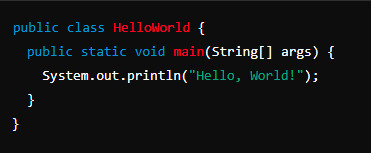
Save the file with a .java extension (e.g., HelloWorld.java).
Compile and Run the Program:
Press Ctrl+B to build and run the program.
The output will appear in the Sublime Text console at the bottom of the window.
Step 5: Troubleshooting Common Issues
If there is any kind of problem in running Java files in Sublime Text 3, then here are a few troubleshooting tips:
Path: The PATH environmental variable should contain the JDK bin directory.
Error Checking Follows: Sublime Text 3 is capable of detecting syntax errors, but you have to make sure and check for the common Java errors in your code as well.
Naming Conventions: The name of the java file should have the same name as that of the public class in your Java.
Conclusion
Using the right plugins and the build systems for Java, Sublime Text 3 is going to be lightweight but powerful software. Whether you are a professional or a beginner in this language, setting up Java in Sublime Text 3 is much straightforward and will significantly increase the quality of your coding experience. Just follow this guide, and in no time you will be running Java programs in Sublime Text 3.
By optimizing your work process in Sublime Text 3, you will be able to spend more time crafting fantastic code and less time learning some super obtuse IDE. Happy coding!
#java certifition course in coimbatore#java training classes#java training institute#Best IT training institute in coimbatore
0 notes
Text
best Java training in Coimbatore
Java training in Coimbatore is best at Upshot Technologies. We give Real-time Project-Oriented Java Course in Coimbatore with comprehensive course topics briefing, practical training of real-time project situations.

0 notes
Text
Getting Started with Selenium: A Comprehensive Beginner's Guide
If you’re keen on automating web testing, Selenium is a leading tool that can transform your approach to software testing.
Embracing Selenium's capabilities becomes even more accessible and impactful with Selenium Training in Coimbatore.

Its flexibility and power make it a popular choice among QA professionals. But where should you begin your journey with Selenium? This guide will help you navigate the essentials and set you on the path to becoming proficient in Selenium.
Grasp the Fundamentals of Automation Testing
Before diving into Selenium, it’s crucial to understand the principles of automation testing. Here’s what you need to know:
What is Automation Testing?: This involves using software tools to run tests on applications automatically, reducing the need for manual testing and enhancing the efficiency and reliability of the testing process.
Understanding Testing Types: Familiarize yourself with different testing methodologies, including unit testing, integration testing, system testing, and acceptance testing, to understand where and how automation fits in.
Select and Master a Programming Language
Selenium supports various programming languages, so choosing the right one is the first step. Here’s how to get started with some popular options:
Java: A popular choice for Selenium users, Java offers extensive resources and community support. You can start with courses on platforms like Udemy or Coursera and find tutorials on GeeksforGeeks or W3Schools.
Python: Known for its ease of use, Python is a great option for beginners. Websites like Codecademy or Python.org provide excellent resources for learning Python basics.
C#: For those in the .NET ecosystem, C# is an ideal choice. Microsoft Learn and Pluralsight offer valuable courses to help you get started with C# and Selenium.
JavaScript: If you’re interested in web development or Node.js, JavaScript might be your language of choice. Learn through freeCodeCamp or JavaScript.info to build a solid foundation.
To unlock the full potential of Selenium and master the art of web automation, consider enrolling in the Top Selenium Online Training.
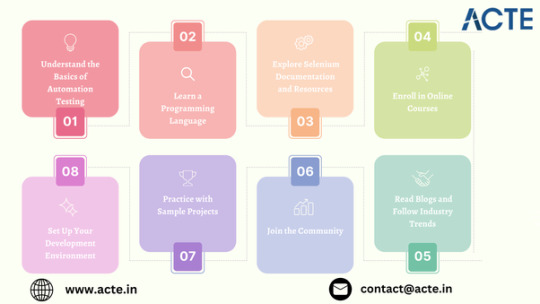
Dive into Selenium’s Official Resources
With your programming language chosen, explore Selenium’s official documentation and resources:
Selenium Official Documentation: The Selenium website offers detailed guides, API references, and getting-started instructions that are invaluable for beginners.
Tutorial Websites: Sites like Guru99, ToolsQA, and Software Testing Help provide structured tutorials and practical examples to help you get acquainted with Selenium.
Enroll in Structured Learning Programs
Enrolling in online courses can provide a structured learning experience:
Udemy: Offers a variety of courses on Selenium, ranging from beginner to advanced levels, often including hands-on projects.
Coursera: Features courses that incorporate Selenium into broader software testing or automation testing curricula.
LinkedIn Learning: Provides practical courses with real-world scenarios to help you apply what you learn effectively.
Set Up Your Development Environment
To start working with Selenium, you’ll need to configure your development environment:
Download Selenium WebDriver: Install the appropriate WebDriver for the browser you intend to use (e.g., ChromeDriver for Chrome, GeckoDriver for Firefox).
Choose an Integrated Development Environment (IDE): Use an IDE or code editor such as IntelliJ IDEA (for Java), PyCharm (for Python), Visual Studio Code (for JavaScript), or Visual Studio (for C#).
Install a Web Browser: Ensure you have a browser like Chrome or Firefox ready for automation.
Practice with Real-World Projects
Applying your skills through practical projects is essential. Start with simple tasks like automating form submissions, navigating through websites, and scraping data. As you gain more confidence, challenge yourself with more complex automation scenarios.
Connect with the Selenium Community
Engaging with the Selenium community can provide additional support and resources:
Forums and Discussion Groups: Join platforms like Stack Overflow or Reddit’s r/selenium to ask questions, share insights, and learn from others.
Meetups and Webinars: Participate in meetups or online webinars to connect with professionals and stay updated with the latest trends in Selenium and automation testing.
Keep Updated with Industry Trends
Stay current with the latest developments in Selenium and automation testing by following blogs and industry news. Websites like Automation Testing Blog and Ministry of Testing offer valuable updates and insights that can help you stay ahead in the field.
Conclusion
Starting with Selenium can significantly enhance your capabilities in automation testing. By understanding automation fundamentals, selecting a programming language, leveraging official resources, and engaging in practical projects, you’ll build a strong foundation in Selenium. Connecting with the community and keeping abreast of industry trends will further support your growth and success in this dynamic field. Happy automating!
0 notes
Text
10 Must-Have Skills for Full Stack Developers

Considering working in end-to-end development? Whether you're starting fresh or looking to enhance your skills, understanding the essential competencies can significantly impact your success in this dynamic field. In this comprehensive guide, we'll delve into the 10 must-have skills every full stack developer needs to thrive, whether you're taking a full stack development course in Coimbatore or exploring opportunities with NextSkills Technologies Pvt Ltd.
1.Mastery of Programming Languages

At the heart of full stack development lies proficiency in programming languages. Key languages like JavaScript, Python, Java, and Ruby serve distinct purposes across both frontend and backend development tasks. A solid grasp of these languages is essential for writing clean, efficient code.
2. Frontend Development Expertise
Frontend development involves crafting user interfaces that are intuitive and visually appealing. Essential skills include HTML5, CSS3, and proficiency in JavaScript frameworks such as React.js, Angular, and Vue.js. These frameworks empower developers to create dynamic and responsive web applications.
3. Backend Development Skills

Backend development focuses on server-side logic, databases, and APIs. Full stack developers should be adept at Node.js, PHP, or Python for backend scripting. Knowledge of API integration and database management (both SQL and NoSQL) ensures seamless data interaction and efficient application performance.
4. Version Control with Git

Proficiency in Git and platforms like GitHub is crucial for collaborative software development. Version control enables developers to track changes, manage code repositories, and coordinate effectively within development teams.
5.Understanding of Databases and ORMs
Full stack developers must possess a solid understanding of database management systems. This includes relational databases like MySQL and PostgreSQL, as well as NoSQL databases such as MongoDB. Additionally, familiarity with Object-Relational Mapping (ORM) tools like Hibernate facilitates data manipulation and retrieval.
6. Responsive Design and UX/UI Principles

A basic grasp of design principles and UX/UI best practices enhances the frontend development process. Tools like Adobe XD or Sketch aid in creating user-friendly interfaces that optimize user experience and engagement.
7. Proficiency in DevOps Practices
Incorporating DevOps practices streamlines the development lifecycle. Understanding CI/CD pipelines, containerization with Docker, and deployment on cloud platforms such as AWS, Azure, or Google Cloud fosters scalability, reliability, and efficient deployment of applications.
8. Web Security Awareness

Ensuring web security is paramount in full stack development. Awareness of OWASP Top 10 vulnerabilities, implementation of secure coding practices, and regular security audits safeguard applications against potential cyber threats and vulnerabilities.
9. Soft Skills for Collaboration
Effective communication, problem-solving, and time management skills are indispensable in a collaborative development environment. These skills foster teamwork, enhance productivity, and contribute to successful project outcomes.
10. Commitment to Continuous Learning

Full stack development is a dynamic field that continuously evolves with technological advancements. Embracing continuous learning and staying updated on emerging trends like AI/ML integration and serverless computing ensures developers remain competitive and adaptable.
Conclusion
By mastering these 10 essential skills, aspiring full stack developers can build a solid foundation for a successful career journey. Whether you're pursuing a full stack development course in Coimbatore or exploring opportunities with NextSkills Technologies Pvt Ltd, acquiring these competencies will equip you to tackle real-world challenges and excel in the ever-evolving tech industry.
For Enquiry:
Nextskill Technologies Pvt Ltd
82/85 Sthithi Square Complex
Near Gem Hospital
Ramanathapuram - 641045
Contact: 7358 1100 62
Website: www.nextskilltechnologies.com
Email: [email protected]
#php full stack developer#full stack development course in coimbatore#full stack development#full stack course#full stack training
0 notes
Text
Must-Have Skills for Aspiring Data Scientists
Data science is a crucial field in today's tech-driven world, with companies relying heavily on data insights. Whether you're starting out or looking to enhance your skills, here are the essential abilities every aspiring data scientist should develop.
Becoming a data scientist is an exciting and rewarding journey that requires dedication, continuous learning, and a passion for problem-solving. With a Data Science Course in Coimbatore, professionals can gain the skills and knowledge needed to harness the capabilities of Data Science for diverse applications and industries.

1. Statistical Analysis and Mathematics
A solid grasp of statistics and mathematics is fundamental for data science. Key areas include:
Descriptive Statistics: Understanding measures like mean, median, mode, variance, and standard deviation.
Probability Theory: Concepts such as probability distributions, Bayes' theorem, and Markov chains.
Inferential Statistics: Techniques for hypothesis testing, confidence intervals, and regression analysis.
Linear Algebra and Calculus: Necessary for understanding machine learning algorithms.
2. Programming Skills
Proficiency in programming is vital for data scientists. Important languages include:
Python: Popular for its readability and extensive libraries (Pandas, NumPy, Scikit-learn, TensorFlow, Keras).
R: Preferred in academia and among statisticians for its powerful statistical packages.
SQL: Crucial for querying databases and managing large datasets.
Julia, Java, and Scala: Useful for specific data science tasks and large-scale data processing.
3. Data Wrangling and Preprocessing
Data is often messy and unstructured. Data wrangling involves cleaning and transforming raw data into a suitable format. This includes:
Handling Missing Values: Using techniques like imputation or removing incomplete records.
Data Normalization and Scaling: Standardizing data for consistent analysis.
Feature Engineering: Creating new features to improve model performance.
4. Exploratory Data Analysis (EDA)
EDA is about uncovering patterns in data through visualization and summary statistics. Essential skills include:
Data Visualization Tools: Matplotlib, Seaborn (Python), ggplot2 (R), and Tableau.
Descriptive Analysis: Identifying trends, correlations, and outliers.
5. Machine Learning
Machine learning is central to predictive analytics. Key skills include:
Supervised Learning: Techniques like linear regression, decision trees, random forests, and support vector machines.
Unsupervised Learning: Methods such as clustering (K-means, hierarchical clustering) and dimensionality reduction (PCA).
Deep Learning: Neural networks, Convolutional Neural Networks (CNNs), Recurrent Neural Networks (RNNs), and frameworks like TensorFlow and PyTorch.
Model Evaluation: Metrics such as accuracy, precision, recall, F1 score, ROC-AUC, and cross-validation.
To master the intricacies of Data Science and unlock its full potential, individuals can benefit from enrolling in the Data Science Certification Online Training.
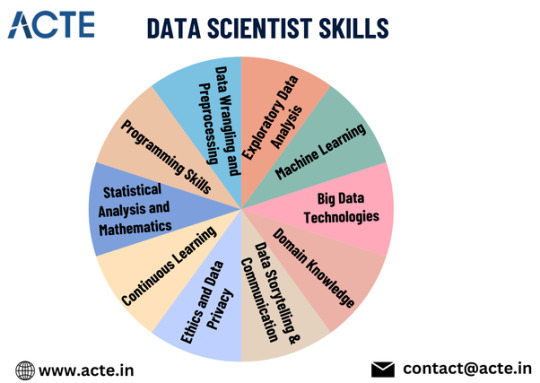
6. Big Data Technologies
Handling large datasets requires knowledge of big data technologies and distributed computing. Important tools include:
Hadoop: A framework for distributed storage and processing.
Spark: A unified analytics engine for large-scale data processing.
NoSQL Databases: Tools like MongoDB and Cassandra for managing unstructured data.
7. Data Storytelling and Communication
Effectively communicating complex analyses as actionable insights is crucial. This involves:
Data Visualization: Creating clear and compelling charts and graphs.
Communication Skills: Explaining technical findings to non-technical stakeholders.
Presentation Skills: Using tools like PowerPoint or interactive dashboards (Tableau, Power BI).
8. Domain Knowledge
Understanding the specific industry you work in (finance, healthcare, e-commerce, etc.) helps you ask relevant questions and make informed decisions.
9. Ethics and Data Privacy
Being aware of the ethical implications of your work is important. This includes:
Data Privacy Regulations: Knowledge of GDPR, CCPA, and other data protection laws.
Bias and Fairness: Ensuring models do not perpetuate or exacerbate biases.
10. Continuous Learning
Data science is a rapidly changing field. Staying updated with the latest tools, techniques, and best practices is essential. This can be achieved through:
Online Courses and Certifications: Platforms like Coursera, edX, and DataCamp.
Reading Research Papers and Blogs: Keeping up with the latest advancements and trends.
Participating in Communities: Joining forums, attending conferences, and contributing to open-source projects.
To thrive as a data scientist, you need a diverse set of skills, from technical expertise to effective communication and ethical awareness. Continuously expanding your knowledge and staying current with industry trends is crucial for success in this dynamic and rewarding field.
0 notes
Text
Best Java Training in Coimbatore
Java training in Coimbatore is best at Upshot Technologies. We give Real-time Project-Oriented Java Course in Coimbatore with comprehensive course topics briefing, practical training of real-time project situations.

0 notes
Text
https://www.excelr.com/full-stack-developer-course-training-in-coimbatore
"Join our comprehensive Full Stack Developer Course in Coimbatore and master the skills needed for both front-end and back-end development. Learn programming languages, frameworks, databases, and deployment strategies to become a proficient full-stack developer ready to tackle real-world projects."
#full stack developer#full stack course#full stack training#full stack web development#full stack software developer
1 note
·
View note
Text
Introduction:
In recent years, Coimbatore has emerged as a burgeoning hub for technology enthusiasts and aspiring developers. With its vibrant ecosystem and growing demand for skilled professionals, the city offers ample opportunities for those looking to dive into the world of full stack development. Full stack development, which involves working on both the front-end and back-end of web applications, has become increasingly essential in today's digital landscape. In this blog, we'll explore the significance of full stack training in Coimbatore and how it can unlock numerous career opportunities for individuals.
The Importance of Full Stack Training:
Full stack development encompasses a broad range of skills, including proficiency in front-end technologies such as HTML, CSS, and JavaScript, as well as back-end technologies like Node.js, Python, or Java. Additionally, knowledge of databases, version control systems, and deployment strategies is crucial for a successful career in this field. By undergoing comprehensive full stack training, individuals can acquire a diverse skill set that allows them to tackle various aspects of web development projects.
In Coimbatore, where the tech industry is thriving, the demand for full stack developers is steadily increasing. Startups, established companies, and IT firms are actively seeking professionals who can seamlessly transition between front-end and back-end tasks, thereby streamlining the development process and delivering high-quality products. By investing in full stack training, aspiring developers in Coimbatore can position themselves as valuable assets in the job market and enhance their career prospects significantly.
Key Components of Full Stack Training:
A robust full stack training program covers a wide range of topics to ensure that participants gain proficiency in both front-end and back-end development. Some of the key components typically included in such training programs are:
Front-end Technologies: Participants learn how to create dynamic and interactive user interfaces using HTML, CSS, and JavaScript. They delve into topics such as responsive design, DOM manipulation, and front-end frameworks like React or Angular.
Back-end Technologies: This aspect of the training focuses on server-side development using languages like Node.js, Python, or Java. Participants learn about handling HTTP requests, building RESTful APIs, and interacting with databases to store and retrieve data.
Databases: Understanding database management systems is essential for full stack developers. Training programs often cover SQL and NoSQL databases, teaching participants how to design schemas, write queries, and optimize database performance.
Version Control: Proficiency in version control systems such as Git is critical for collaborative development. Participants learn how to use Git for managing code repositories, branching, merging changes, and collaborating with team members effectively.
Deployment and DevOps: Full stack training also encompasses deployment strategies and DevOps practices. Participants gain hands-on experience with tools like Docker, Kubernetes, and CI/CD pipelines, learning how to automate build, test, and deployment processes.
Benefits of Full Stack Training in Coimbatore:
Career Advancement: Full stack developers are in high demand across various industries, including e-commerce, finance, healthcare, and technology. By acquiring full stack skills through training in Coimbatore, individuals can expand their career opportunities and explore diverse roles in the IT sector.
Versatility: Full stack developers possess a versatile skill set that allows them to work on different parts of the development stack. Whether it's designing user interfaces, implementing business logic, or optimizing database performance, full stack professionals can contribute to all aspects of a project, making them indispensable assets to any team.
Entrepreneurial Opportunities: Coimbatore's burgeoning startup ecosystem presents ample opportunities for aspiring entrepreneurs with full stack development skills. By understanding both front-end and back-end technologies, individuals can ideate, prototype, and launch their own web-based products or services, fueling innovation and driving economic growth in the region.
Competitive Edge: In today's competitive job market, employers are increasingly seeking candidates with diverse skill sets who can adapt to evolving technologies and industry trends. Full stack training equips individuals with the expertise and confidence to tackle complex development challenges, giving them a competitive edge over their peers.
Conclusion:
Full stack training in Coimbatore holds immense potential for individuals looking to embark on a rewarding career in web development. By mastering both front-end and back-end technologies, participants can unlock numerous opportunities in the thriving tech industry of Coimbatore and beyond. Whether it's landing a lucrative job at a leading company, launching a startup venture, or freelancing as a full stack developer, the possibilities are endless for those willing to invest in their skills and embrace the dynamic world of full stack development.
1 note
·
View note
Text
Exploring Varied Programming Languages in Data Science Beyond Python and R.
Data science has become integral to industries, extracting insights and steering data-driven decisions. Programming languages form its core, with Python and R reigning supreme for years. However, a trend of diversification beyond these has emerged. In this blog, we delve into the significance of programming languages in data science, the emerging trend of using diverse languages, and the relevance of enrolling in a Data Science Course in Coimbatore for staying ahead in this dynamic field.
Overview of Python and R in Data Science:
Python and R, cherished for their simplicity and robust libraries, dominate data science. Python's versatility suits analysis, machine learning, and web development, while R excels in statistical computing. Limitations like speed and memory usage, particularly with vast datasets, motivate exploration beyond these languages.
Alternative Programming Languages for Data Science:
To overcome Python and R limitations, data scientists are exploring alternatives. Julia's speed and capacity for large datasets gain traction, Scala integrates with Apache Spark for big data, Java boasts a robust ecosystem for large-scale processing, and SQL remains vital for database operations. These alternatives offer expanded tools and functionalities.
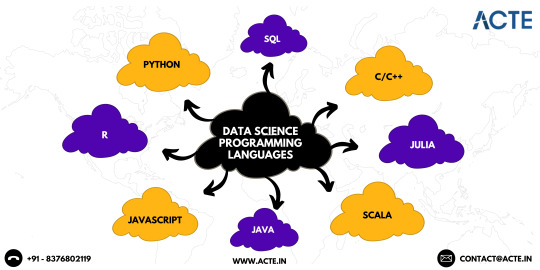
Specialized Languages for Niche Applications:
MATLAB, tailored for engineering and science, excels in matrix operations. SAS, a stalwart in statistical analysis and business intelligence, remains reliable. JavaScript, primarily a web language, gains popularity for dynamic data visualization.
Emerging Languages and Trends:
As data science evolves, so do programming languages. Emerging languages like Go (Golang) for simplicity and concurrency, Rust for performance and safety, and Kotlin for interoperability with Java and flexibility in data-driven applications gain prominence. Enrolling in a Data Science Course Online is crucial for mastering these innovative tools.

Considerations for Language Selection:
Choosing the right language amid the multitude can be overwhelming. Project requirements, community support, learning curves, and accessibility are crucial considerations. Successful implementations, such as Airbnb's use of R, SQL, Python, Scala, and JavaScript, underscore the need for careful language selection and fostering a culture of learning.
In a rapidly evolving data science landscape, embracing diverse languages and continuous learning is pivotal. The strategic choice of programming languages, coupled with education through courses like the "Data Science Course in Coimbatore" or online, empowers data scientists to navigate complexities, unlock insights, and contribute significantly to their fields.
#data science certification#data science course#data science training#datascience#technology#python#javascript#r programming#sql
1 note
·
View note
Text
Best J2EE Java Training Course in Coimbatore
Java training in Coimbatore is best at Upshot Technologies. We give Real-time Project-Oriented Java Course in Coimbatore with comprehensive course topics briefing, practical training of real-time project situations
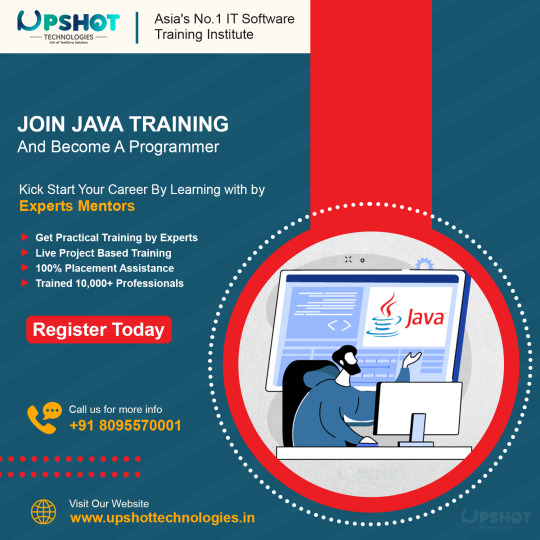
0 notes
Text
oracle training in coimbatore
Oracle is a computer software and hardware company. They are the world's second largest software maker.we are providing best oracle training in coimbatore with new updated syllabus with 15 years experience facallty.
What is Oracle and what is it used for?
Oracle is a product of Oracle Corporation, which provides a related database management system. Oracle’s RDBMS supports any data model and includes different product versions, such as the Standard Edition, the Enterprise Edition, the Express Edition, and the Personal Edition, from which the user chooses the database layout according to their needs. Oracle products are more efficient, scalable, and secure compared to other databases available in the market.
What is Oracle?
Its database is also simply called Oracle. It is a multi-modal database management system designed primarily for enterprise grid computers and databases. It is also one of the first options for low-cost solutions for enterprise applications and data management. It supports SQL as the query language for interacting with the database.
Currently, its database comes in five different versions based on the features available
Sparkdatabox is one of the best online software training course with free certification in coimbatore. They offer Oracle Database, Java, Apache Tomcat, SQL and other courses.
The Oracle training institute in Coimbatore offers various courses for different levels of expertise. They have a course for beginners as well as for experts
.
#sql training in coimbatore#oracle Classes in Coimbatore#oracle course in coimbatore#best oracle training in coimbatore#oracle course fee in coimbatore#software training institute in coimbatore#sparkdatabox in coimbatore
1 note
·
View note
Photo

Nschool providing Core Java Training by the Expert level Professionals. We are the Best Java Training Institute in Coimbatore with 100% JOB Placements
#JAVA TRAINING INSTITUTE IN COIMBATORE#Best Java Training classes#CORE JAVA DEVELOPMENT COURSE#core Java Development Certification course
0 notes
Text
Best Java certification Training in Coimbatore
Java training in Coimbatore is best at Upshot Technologies. We give Real-time Project-Oriented Java Course in Coimbatore with comprehensive course topics briefing, practical training of real-time project situations

0 notes
Photo

Java course | java courses coimbatore | java developer training and placement | java certification course | java courses in coimbatore
Java became the popular Digital Technologies of all time. It is now used in Web Designing and other sectors, mostly preferred by a fresher. To build a small web application on the mobile phone to a huge enterprise application that runs on the internet, we apply Java/J2EE programming language.
#java certification course#Java course#java developer training and placement#java courses in coimbatore
0 notes